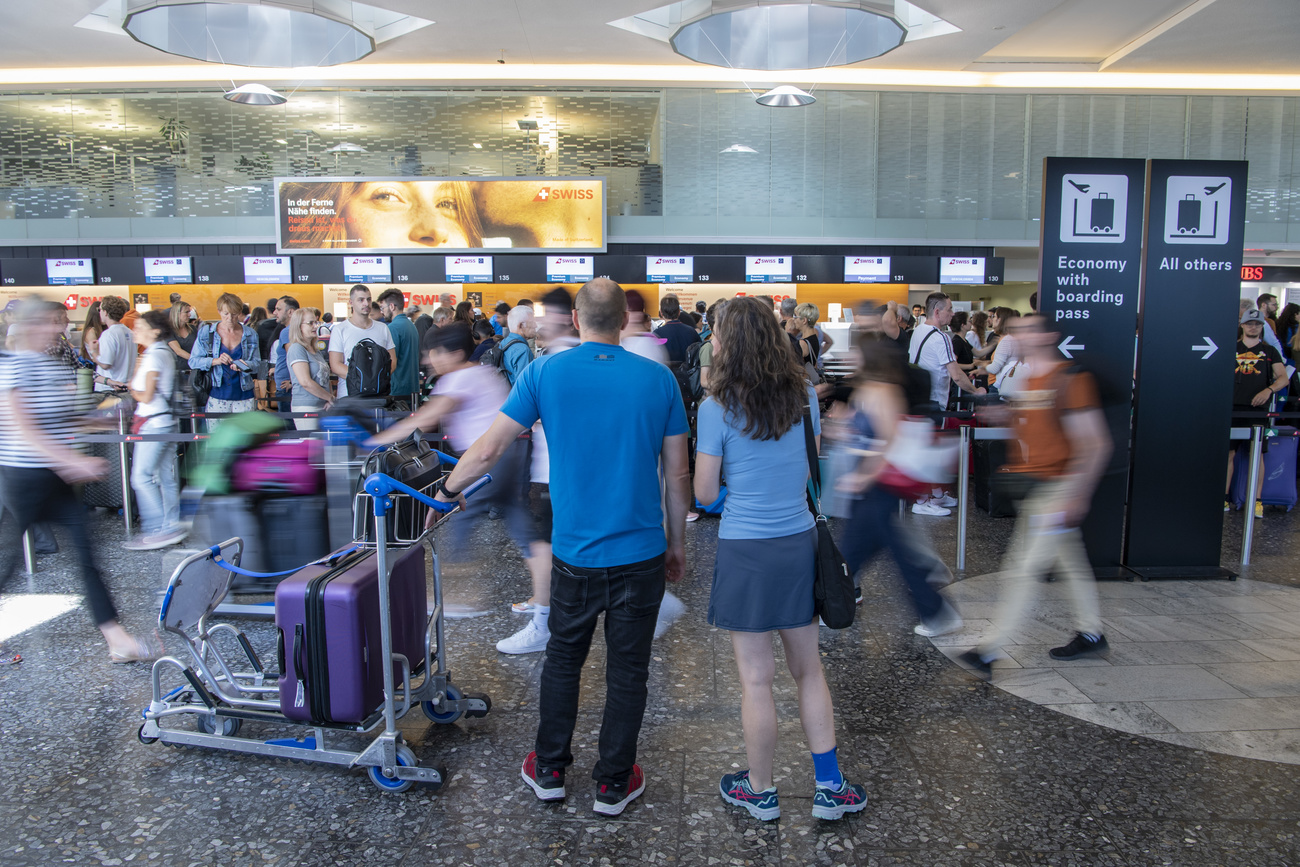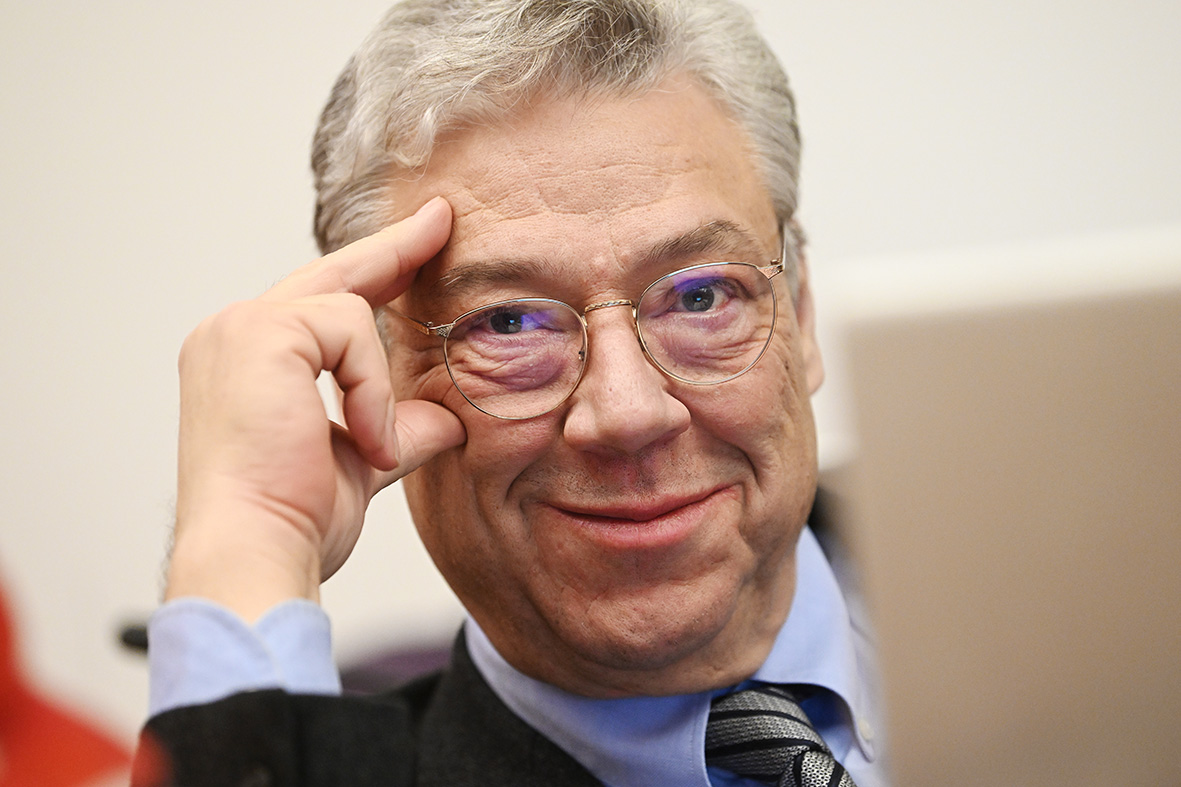Ariane Rustichelli: ‘The interests of the Swiss Abroad got more attention before the pandemic’

After almost 17 years with the Organisation of the Swiss Abroad (OSA/SwissCommunity), ten of which as director, Ariane Rustichelli announced last week that she would be leaving the body that defends the interests of the diaspora.
Faster, more complex work, financial pressure, structural modernisation: the challenges facing the OSA are numerous. During her ten years at the helm of the lobby for the Swiss Abroad, Rustichelli has experienced many developments. She takes stock of her experience and the challenges facing the OSA and the Swiss Abroad in the months and years ahead.
SWI swissinfo.ch: Why have you decided to leave the Organisation of the Swiss Abroad after 17 years of service?
Ariane Rustichelli: I’m leaving for very personal reasons, as I turned 50 this year. People often say that you have to take stock at that age, and that’s always made me smile. But I have to admit it’s true!
I simply need to take on other challenges in the years I have left to work, and I believe that people simply move on, while the institution remains.
SWI: So what are your plans?
A.R.: The aspect I’ve always been most enthusiastic about in my work at the OSA is the human dimension, sitting around the same table with people with differing opinions and finding compromises. That’s why I’m going to head up the new “Partnerships and Networking” department of canton Bern’s disability insurance.
My experience at the OSA, where I navigated political, strategic and human issues, will be invaluable in structuring and energising this new department. I’m convinced that stakeholder management is the key to finding innovative and inclusive solutions.
SWI: Has your work as OSA director become more complex in recent years?
A.R.: Definitely. The job has always had a strong political dimension, but other aspects have been added over the years: network development, digital transformation and managing multiple partnerships. Today, we no longer work in silos, but rather across the board.
Being at the helm of SwissCommunity also requires a wide range of skills, a love of diversity and the ability to multitask. In a single day, I can go from very high-level strategic discussions to very concrete operational tasks. It’s this versatility and ability to find synergies that enable a small organisation like ours to move forwards.

More
The Swiss Abroad in nine charts
SWI: The Swiss Abroad are less involved than they used to be. This is reflected in the ever-decreasing number of members of Swiss clubs abroad. Do they need the OSA less than they used to?
A.R.: I don’t think it’s a question of a lack of interest, but rather a change in expectations and ways of socialising. Today, people are looking for more direct and instantaneous exchanges, often via social networks, which have transformed the way we communicate. Swiss Abroad meet up less often than they used to, often for a special event such as the August 1 celebrations.
In a more unstable world, with growing geopolitical tensions, the Swiss Abroad contact us above all when they are facing difficulties. We’re also finding that in times of distress, people are more demanding and impatient, demanding a faster response with ever-better quality. This is also forcing us to rethink the way we work with the Swiss community abroad.
SWI: Are the OSA’s operations and structure able to meet these new demands?
A.R.: The organisation is facing major institutional and strategic challenges. The structure has always evolved, but in recent years the pace has quickened considerably, in line with the changes taking place in society as a whole.
To meet these demands, we have relied on collective intelligence by encouraging the creation of working groups within the Council of the Swiss Abroad. This enables us to capitalise on the expertise of our delegates and keep in step with the expectations of the Swiss Abroad.

More
Trooping Swiss colours in the UK
SWI: In recent months, there have been some critical voices among delegates, particularly concerning the electoral system of the Council of the Swiss Abroad, which is generally considered to be the ‘parliament’ of the Swiss Abroad.
A.R.: These criticisms are above all a sign of a clear attachment to the OSA. I admit that at first I was a bit unsettled by this, but with hindsight I realise that it was really beneficial. Perhaps it was also at that point that I started to think about the routine I’d settled into, because I recognise myself more as someone who makes things happen than being in a wait-and-see role.
Ariane Rustichelli holds a Master’s degree in art history, history and journalism from the University of Neuchâtel. She has also completed courses in marketing, an EMBA in innovation and sustainable development and a diploma in strategic management of non-governmental organisations (NGOs).
After starting her career in the watch industry, she moved into the cultural sector, where she worked as a scientific collaborator and communications consultant. In 2008, she joined the Organisation of the Swiss Abroad (OSA) as head of marketing & communications. She became co-director in 2014 and director in 2019.
SWI: The OSA’s finances are in a parlous state, with major sponsors withdrawing in whole or in part. The Congress of the Swiss Abroad, the organisation’s showcase event, will be held only every four years from now on, and it’s been several years since any Federal Councillors have attended. Have the Swiss Abroad lost interest in politics too?
A.R.: I have the impression that, up until 2020 and the Covid-19 pandemic, perhaps the interests of the Swiss Abroad got more attention before the pandemic. Since then, one extraordinary situation has followed another, with the wars in Ukraine and the Middle East.
This new geopolitical situation calls for strong political reactions and financial investments at government level, which pushes other issues, such as the Swiss Abroad, under the radar, which is very regrettable.
As for the Congress, it will be held every four years, and in the other years we will be organising “SwissCommunity Days”, a slimmed-down, revamped version. Here too, we are reinventing ourselves!
SWI: Since the departure from parliament of Tim Guldimann, the only representative of the Swiss Abroad in the House of Representatives (between 2015 and 2018), and the non-reelection to the Senate in 2019 of Filippo Lombardi, a passionate defender of the interests of the Swiss Abroad, are there still strong voices capable of championing the causes of the diaspora?
A.R.: As society has evolved, we have moved from a hierarchical approach, where decisions came from above, to a more collective and collaborative approach. Today, there is rarely a single spokesperson but rather several parliamentarians working in a coordinated fashion. It may be less spectacular, but it’s no less effective, and that’s what’s important.

More
Swiss Abroad president says communication is still a challenge
SWI: What challenges does the OSA face in the coming years?
A.R.: First and foremost, the organisation needs to stay in touch with the Swiss Abroad and listen to their needs. It also needs to anticipate future changes to ensure that it remains relevant.
Finally, the small team at the OSA secretariat will continue to be heavily involved in the changes ahead. Each and every one of us plays an essential role, and we need to have strong shoulders to meet these challenges.
Edited by Samuel Jaberg. Translated from French by DeepL/ts

In compliance with the JTI standards
More: SWI swissinfo.ch certified by the Journalism Trust Initiative









You can find an overview of ongoing debates with our journalists here . Please join us!
If you want to start a conversation about a topic raised in this article or want to report factual errors, email us at english@swissinfo.ch.